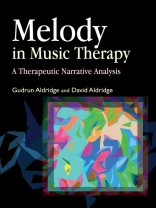Melody is thought to be an ‘essential core’ of music. In the context of music therapy, looking at how patients develop their own melodies in improvisation can explain how they find their own voice, determine their position in relation to the world, and play an important role in how they relate to their therapist.
Gudrun Aldridge and David Aldridge explore the concept of melody within its historical context and investigate current theories of melody. They make recommendations for choosing an appropriate method of analysing melodic improvisation, and utilise case studies to demonstrate these analyses in practice. They show how the interaction between patient and therapist is affected by the patient’s melodic statements, and how the process of improvisation offers patients a chance to transform their inner emotions into externalised expressions.
Melody in Music Therapy is an important addition to music therapy literature, and will be of interest to music therapists, educators and students alike, as well as musicologists.
Tabela de Conteúdo
1. Melody in the Context of Music Understanding. 2. Characteristics of the Current Concept of Melody. 3. Aspects of Music Therapy in Their Contexts. 4. Search for the Appropriate Method. 5. Therapeutic Narrative Analysis: A Methodological Proposal for the Interpretation of Music Therapy Traces. 6. The Emergence of a Melody in the Course of an Improvisation: `A Walk Through Paris’. 7. The Process of Listening Analysis. 8. Analysis and Results. 9. Integrating Episodes and the Melody `A Walk In Paris’. 10. The `Farewell Melody’. 11. Listening. 12. Analysing the `Farewell Melody’. 13. Relation between Episodes and the `Farewell Melody’. 14. Significance and Relevance. Bibliography. Subject Index. Author Index.
Sobre o autor
Gudrun Aldridge is a music therapist, university lecturer and supervisor in Germany. She studied music therapy in London and carried out her doctoral research at Aalborg University in Denmark. Her main areas of interest are psychosomatic medicine, music therapy with breast cancer and dementia patients, and the links between music sciences, aesthetics and therapy. She has previously contributed to several music therapy books, including Case Study Designs in Music Therapy and Music Therapy in Palliative Care, also published by Jessica Kingsley Publishers.












